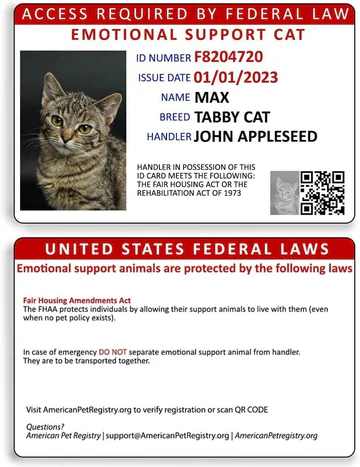Psychiatric service animals (PSAs) offer unmatched support for people with mental health and psychiatric issues. Understanding their roles and benefits helps you appreciate their impact.
In this article, we’ll dive into the ways PSAs assist with mental health and why they are more than just pets. But first, let’s understand what they are and what they do.
Understanding Psychiatric Service Animals
PSAs are specially trained to help people with psychiatric disabilities. Unlike emotional support animals (ESAs), which provide comfort through companionship, PSAs perform specific tasks to mitigate their owner’s psychiatric symptoms.
These animals undergo rigorous training to become certified and equipped to handle various mental health challenges.
Roles and Tasks of Psychiatric Service Animals
PSAs perform several tasks that are essential for their owners’ well-being:
Providing Emotional Support
- PSAs offer constant companionship, reducing feelings of loneliness. This can be especially comforting during panic attacks or depressive episodes. For instance, a PSA might cuddle with their owner during an anxiety attack to provide a calming presence.
Performing Specific Tasks
- PSAs retrieve medication or remind you to take it. They can be trained to interrupt harmful behaviors, like scratching or hitting. For example, if someone with schizophrenia is experiencing hallucinations, a PSA can guide them to a safe place and help ground them.
- They can also guide their owner to a safe place during an anxiety attack, helping to avoid triggers.
Enhancing Daily Functioning
- PSAs wake their owners from nightmares or night terrors. This is particularly helpful for those with PTSD. Imagine a dog gently nudging you awake from a traumatic dream, helping you feel safe again.
- They can alert their owner to rising anxiety levels before a full-blown attack, giving them time to take preventive measures. For someone with severe anxiety, this can mean the difference between a manageable day and a debilitating one.
- Providing a sense of routine and stability, PSAs help you stick to a daily schedule, which can be incredibly grounding.
Legal Protections and Rights
PSAs have legal protections under the Americans with Disabilities Act (ADA). This legal protection allows them to accompany their owners in public places, even where pets are usually not allowed. They also have rights when it comes to housing and travel accommodations. Knowing these rights ensures that you and your PSA can navigate life without unnecessary barriers.
Benefits of Psychiatric Service Animals for Mental Health Management
Emotional Stability
- PSAs reduce symptoms of anxiety, depression, and PTSD. Their constant presence offers a sense of security. For someone with depression, knowing their PSA is there can make the world seem less challenging.
Increased Independence
- PSAs enable you to engage more fully in daily activities. You become less reliant on human caregivers, gaining confidence and self-reliance. Imagine being able to go grocery shopping alone because your PSA is there to support you. Or not having to wait for a human caregiver to function in day-to-day life.
Improved Social Interaction
- PSAs facilitate social engagement, reducing isolation. They help you feel more confident in social settings, making it easier to connect with others. This can be particularly beneficial for someone with social anxiety.
Personal Stories and Testimonies
Real-life examples highlight the impact of PSAs:
- A veteran with PTSD shared how their PSA wakes them from nightmares, allowing them to return to sleep peacefully.
- Another testimony comes from someone with schizophrenia who described how their PSA helps them distinguish between reality and hallucinations by providing a calming and grounding presence.
- These stories show the tangible benefits and emotional support PSAs provide.
Conclusion
Psychiatric service animals have become a beacon of hope for many mental health and psychiatric patients. They offer more than companionship; they provide practical assistance and emotional stability.
By understanding and appreciating the roles of PSAs, we can better support those who rely on these incredible animals. If you or someone you know could benefit from a PSA, consider exploring the process of acquiring and registering one. These animals can make a difference in managing mental health issues and boosting overall quality of life.
















